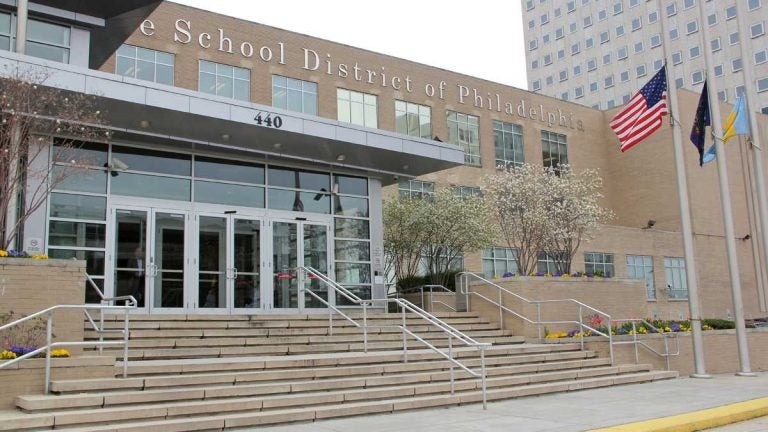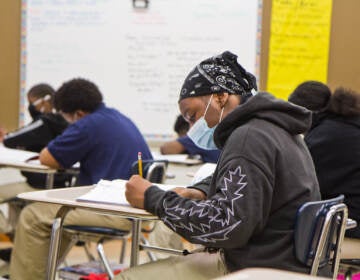Six struggling Philly schools to be reshuffled, possibly with new teachers

Philadelphia School District headquarters (Emma Lee/WHYY)
In what’s become a yearly ritual, the School District of Philadelphia said Tuesday it will reshuffle six low-performing schools in hopes of turning them around.
How exactly the district reshuffles the sextet of schools won’t be announced until later this school year, but it’s possible the schools could experience a massive turnover of staff or administrators.
In the past, district turnaround schools have replaced more than 50 percent of their staff, although it’s unclear if or where that might happen during this round of interventions.
The six schools slated for shakeup are:
Edward Steel, a K-8 school in North Philadelphia;
Edward Gideon, a K-8 school in North Philadelphia;
Feltonville School of Arts and Sciences, a 6-8 school in North Philadelphia;
Wagner, a 6-8 school in North Philadelphia;
James Rhoads, a K-8 school in West Philadelphia;
Penn Treaty, a 6-12 school in Fishtown.
Last year, the district named 11 “focus” schools, but ended up implementing new strategies at only seven of the schools.
District officials are tackling a smaller number of schools this year and, for the second year in a row, shelving some of their most drastic interventions. Like last year, the district will not convert any of its focus schools into charter schools through the Renaissance Charter Schools Initiative, and it will not close any of the low-performing schools named Tuesday.
Last year, the district said it was conducting a “comprehensive review” of the Renaissance Charter process. Officials say the review is ongoing, and that charter conversion, again, won’t be an option this year. So far, through the Renaissance Charter Schools Initiative, 22 district schools have been taken over by charter-management organizations. Of those 22, all but one remain charter schools. The district has recommended five other Renaissance Charter schools for non-renewal, but the School Reform Commission has yet to act on those recommendations.
The district also vowed not to close any of the six struggling schools identified Tuesday, but it may close other schools. The district’s long-term plan calls for three school closures each year to keep pace with declining enrollment. A district representative said there will be a separate process for determining school closures.
Schools can come up with plan for improvement
All of the schools announced Tuesday meet three main criteria. All have been “low performing” for three consecutive years, according to the district; none is undergoing any sort of school turnaround process; and all have a three-year average of 15 or lower on the district’s 100-point performance scale known as SPR.
This fall, each school will host community meetings and be reviewed by an outside evaluator. The schools will then be able to offer their own improvement plans, which the district can then accept or reject.
In the past, schools have made teachers reapply for their jobs, replaced administrators, teamed up with outside organizations, crafted new academic models that focus on specific subject areas, or merged with higher-performing schools. Schools slotted into this academic intervention process can also wind up in the district’s turnaround network, which requires staff members reapply for their jobs and prevents schools from rehiring more than 50 percent of the prior year’s staff.
The district has also sunk extra money into focus schools — sometimes as much as $1 million. A district representative would not say how much the district might invest in this year’s batch of turnaround schools, but did say additional supports would be made available.
Of the schools named Tuesday, two have already come up in turnaround conversations.
Last year, Edward Gideon was selected as one of the city’s inaugural community schools. Mayor Jim Kenney, who wants to create 25 community schools over his first term, is funding the projects with money generated by the new sweetened beverage tax.
Edward Steel nearly underwent a major overhaul three years ago when parents voted on whether to join the Renaissance Charter Schools Initiative and become part of the Mastery Charter Schools network. Parents ultimately rejected the move, and Superintendent William Hite pledged extra resources to help the struggling school, according to the Philadelphia Public School Notebook.
Kendra Brooks, parent of a Steel fourth grader, said the school experienced a teacher and administrator exodus after the attempted Mastery takeover. She worries Steel will be uprooted again.
“It puts us back in this constant cycle of instability,” Brooks said.
She does believe the school needs extra help and is cautiously optimistic about the potential for new money.
“The school we fought for is not necessarily the school we have now,” she admitted.
But overall Brooks is exasperated by the seemingly constant specter of change and churn.
“When it’s the same thing over and over again you start thinking what are you fighting for now,” Brooks said. “I’m not even sure who to fight at this point.”
“I’m very fearful,” she added.
Steel’s SPR — which is based on a combination of test scores and school climate measures — has not improved since the aborted turn around effort three years ago. Last year, Steel scored a 12, the same number it earned the prior year and one up from the score it earned in 2014-15.
“Despite investments made in all schools, some schools are not meeting students’ needs and parents’ expectations,” Hite said in a statement. “We will prioritize a set of schools to receive focused intervention to drive schoolwide academic improvement and ensure better outcomes for our students.”
Teachers union not a fan
Though the district seems to have scaled back its turnaround plans this year, the central conceit of the initiative still rankles many teachers, said Philadelphia Federation of Teachers President Jerry Jordan.
“Does this mean I’m supposed to jump up and down,” asked Jordan, rhetorically. “No. I’m not.”
Jordan said the district’s school turnaround initiatives don’t improve academics and disincentivize teachers from taking jobs at tough schools by signaling to them that they may be replaced.
“This reform model is not a reform model but a punitive blame model,” Jordan said. “It puts in place a system that says to educators that if you want to avoid unpleasantness such as this, you don’t stay in a neighborhood school. You go to a school that is a higher-performing school, and you’ll be able to do your job”
Between now and November, each of the six schools will host a kick-off meeting, a community town hall, and multiple parent focus groups. More information about those meetings is available on the district’s website.
The district did not say when it would release final plans for the six schools; last school year, the decisions were released in February.
WHYY is your source for fact-based, in-depth journalism and information. As a nonprofit organization, we rely on financial support from readers like you. Please give today.





